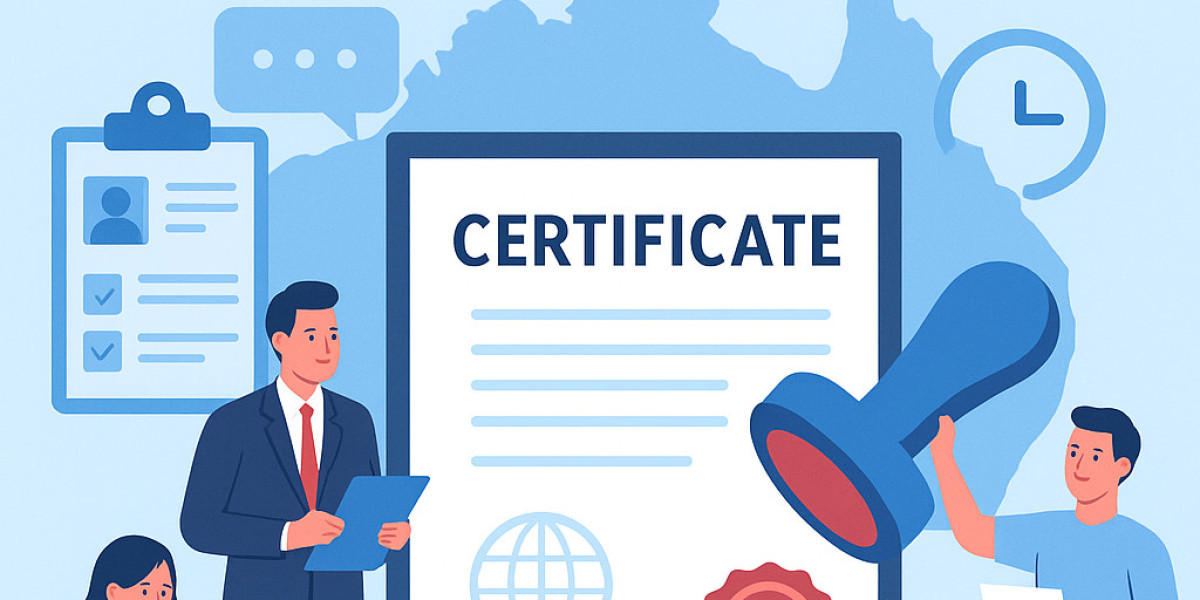When people think about international opportunities—whether it’s for education, employment, migration, or business—official documentation is the invisible bridge that connects one country to another. Among the most important processes in this context is certificate attestation, particularly when documents originate from Australia. For individuals with urgent timelines, understanding how to secure fast Australia certificate attestation becomes essential. This guide offers a complete overview of the attestation process, the challenges people face, and practical strategies to accelerate it without compromising accuracy.
What is Certificate Attestation and Why Does it Matter?
Certificate attestation is the process of validating a document issued in one country so that it is recognized as genuine in another. For example, if you studied in Australia and now wish to work in the UAE, Qatar, Saudi Arabia, or another Gulf country, your academic degrees must be verified by the relevant Australian authorities as well as the foreign embassy of your destination country. Without attestation, your certificates may be deemed invalid abroad.
The attestation process acts as a safeguard against fraudulent documents and ensures that all individuals—whether students, employees, or entrepreneurs—are operating with legitimate paperwork. For urgent needs, such as a job offer with a strict joining deadline or last-minute migration requirements, understanding how to fast-track this process can make the difference between seizing an opportunity and losing it.
Common Situations Requiring Urgent Australia Certificate Attestation
Urgency often arises from situations beyond an individual’s control. Some of the most common scenarios include:
Job Offers Abroad – Many employers in Gulf countries require attested degrees and professional certificates before issuing work visas. A delay in attestation could mean missing the joining deadline.
Student Admissions – Universities in the Middle East, Europe, and Asia often require attested academic transcripts and degrees for enrollment. Delays may risk losing admission or scholarship opportunities.
Migration and Residency Permits – Countries like Canada, New Zealand, or Middle Eastern states request attested birth, marriage, or police clearance certificates for family visas and permanent residency.
Business Expansion – Entrepreneurs registering companies or opening branches overseas often need attested incorporation documents or financial statements.
Medical Emergencies – Attested medical certificates may be required for urgent travel, especially when relocating family members for treatment.
In all these cases, speed becomes a critical factor, making it necessary to explore fast-track solutions.
Understanding the Attestation Process for Australian Documents
The Australian certificate attestation process involves multiple stages, each handled by different authorities. For urgent needs, the key is to understand this chain clearly so that no time is wasted.
Step 1: Notarization
The first step is having the document notarized by a recognized notary public in Australia. Notarization confirms that the document is genuine and has been signed in the presence of a legal authority.
Step 2: Authentication by the Department of Foreign Affairs and Trade (DFAT)
DFAT is the central body that authenticates Australian documents. Depending on the requirements of the destination country, DFAT will either issue:
Authentication Certificate, or
Apostille Certificate (for countries that are members of The Hague Apostille Convention).
This step is crucial because it validates the document at a federal level.
Step 3: Attestation by the Embassy or Consulate of the Destination Country
After DFAT’s authentication, the document must be submitted to the embassy or consulate of the country where the certificate will be used. This authority places its stamp or seal, confirming that the document is now valid for use in that country.
Step 4: Ministry of Foreign Affairs in the Destination Country
Some countries, especially in the Gulf, may require one final attestation from their Ministry of Foreign Affairs once the document has entered their jurisdiction.
Each stage is dependent on the previous one, which makes the process time-sensitive. Delays at any level can cause setbacks, particularly for those with urgent deadlines.
Why the Process Often Gets Delayed
Despite best efforts, many applicants encounter delays in certificate attestation. The main reasons include:
Incomplete Documentation – Missing notarization, incorrect signatures, or expired documents can stall the process.
Lack of Awareness – Many individuals are unaware of the correct order of steps, leading to rejections and resubmissions.
Embassy Backlogs – Embassies sometimes have long processing queues, especially during peak seasons.
Courier Delays – International document transfers can be affected by customs checks or postal inefficiencies.
Public Holidays – National holidays in either Australia or the destination country often extend waiting times.
For urgent cases, recognizing these bottlenecks is the first step to overcoming them.
Strategies to Fast-Track Australia Certificate Attestation
When time is short, applicants can use several methods to expedite the attestation process without compromising compliance.
1. Hire a Professional Attestation Service
Using a professional attestation agency is one of the most effective ways to save time. These agencies have established networks with notaries, DFAT, and embassies, enabling them to streamline the process. Some agencies also offer express attestation services where documents are prioritized for urgent cases.
2. Prepare Documents in Advance
Before beginning the attestation process, ensure that all required documents are complete, up-to-date, and notarized. Having multiple copies ready can also prevent delays in case one set is rejected.
3. Use Courier Services Instead of Regular Post
For urgent cases, opting for express courier services like DHL, FedEx, or UPS ensures faster and more reliable delivery between authorities.
4. Check Embassy Requirements Before Submission
Each embassy has specific guidelines. For instance, some require translations into Arabic or another language. Submitting documents without meeting these requirements may result in rejection and wasted time.
5. Opt for Walk-In or Premium Counters
Some embassies and government offices offer walk-in counters or premium paid services for urgent applications. Although these may come at a higher cost, they significantly reduce processing time.
6. Combine Attestation with Apostille (When Applicable)
If your destination country is part of the Hague Apostille Convention, request an apostille from DFAT instead of full embassy attestation. This step alone eliminates additional embassy visits and speeds up the process.
Estimated Timelines for Urgent Australia Certificate Attestation
The timeline for fast-track attestation varies depending on the destination country. Generally, the process can take anywhere from 3 to 15 working days when expedited.
DFAT Apostille or Authentication – 1–3 working days (express option available).
Embassy Attestation – 2–7 working days (varies by embassy workload).
Courier Delivery – 1–3 working days (express courier).
With professional assistance, the entire process can sometimes be completed within a week, which is critical for urgent requirements.
Costs Involved in Fast-Track Attestation
Fast attestation services often come with additional costs compared to regular processing. These may include:
Notary Fees – Charges for document notarization.
DFAT Fees – Costs for authentication or apostille.
Embassy Fees – Vary depending on the destination country.
Service Provider Fees – Agencies charge for expedited handling.
Courier Charges – Costs for express delivery.
While urgent attestation may seem expensive, it is often more cost-effective than missing a job offer, scholarship, or visa deadline.
Common Mistakes to Avoid in Urgent Cases
When pressed for time, people often make avoidable mistakes that delay attestation further. Some of these include:
Submitting photocopies instead of original documents.
Forgetting to notarize documents before sending to DFAT.
Not checking embassy-specific translation requirements.
Choosing regular postal services instead of express couriers.
Relying on unverified service providers who may misplace documents.
Avoiding these pitfalls is essential to ensure that fast-tracking efforts are not wasted.
The Role of Technology in Speeding Up Attestation
In recent years, digital advancements have made certificate attestation more efficient. Some agencies now provide:
Online Tracking Systems – Applicants can monitor real-time progress of their documents.
E-Notarization Services – Remote notarization of certain documents reduces travel time.
Document Pre-Checks – Digital scans are reviewed before originals are sent, preventing rejections.
Leveraging technology not only accelerates the process but also reduces the stress of uncertainty.
How to Choose the Right Attestation Service Provider
When urgency is involved, choosing the right service provider is as important as the process itself. Consider the following factors:
Reputation and Reviews – Look for agencies with a history of reliable, fast services.
Transparency in Pricing – Ensure there are no hidden charges.
Turnaround Guarantees – Some agencies offer guaranteed timelines for urgent needs.
Customer Support – 24/7 availability can be helpful for applicants working across time zones.
Security Protocols – Since you’re handing over valuable documents, choose providers with strict security measures.
Case Example: An Urgent Job Offer in Dubai
To illustrate how fast attestation works in practice, consider the case of an Australian engineer offered a position in Dubai with a joining deadline of just two weeks. His employer required attested academic degrees and a police clearance certificate.
By engaging a professional attestation agency, he was able to:
Get his degree notarized and authenticated by DFAT within two days.
Have the UAE embassy complete attestation in three working days.
Use express courier services to deliver documents back within two days.
The entire process was completed in a week, allowing him to join his new company on time.
Conclusion: Preparing for Urgent Attestation Needs
Australia certificate attestation is an unavoidable step for anyone planning to use official documents overseas. While the process can seem time-consuming, proper planning and professional assistance make it possible to complete attestation quickly, even under urgent circumstances.
The key lies in understanding the process, anticipating potential delays, and using fast-track strategies such as professional agencies, express couriers, and embassy premium services. For individuals with pressing deadlines—whether for work, education, or family migration—fast certificate attestation is not just a convenience; it is often the gateway to life-changing opportunities abroad.
By following the strategies outlined in this guide, applicants can ensure their documents are validated efficiently and on time, without unnecessary stress. In an increasingly globalized world, where opportunities often come with tight schedules, the ability to secure urgent attestation is a valuable advantage.



